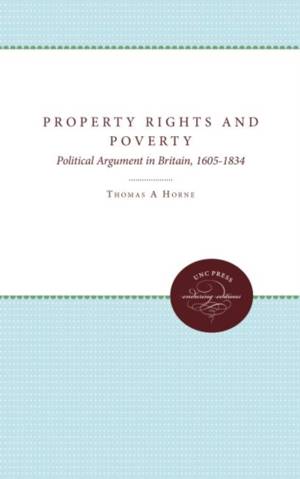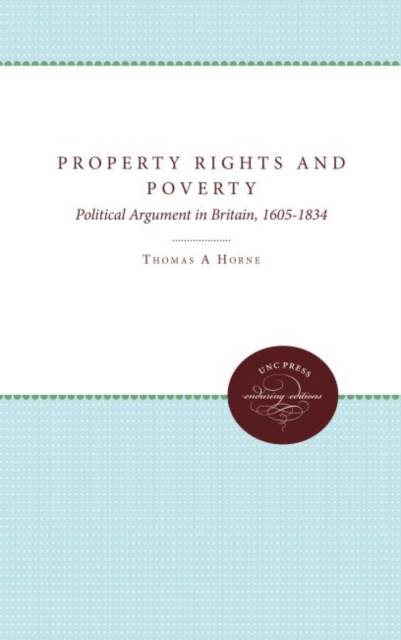
- Retrait gratuit dans votre magasin Club
- 7.000.000 titres dans notre catalogue
- Payer en toute sécurité
- Toujours un magasin près de chez vous
- Retrait gratuit dans votre magasin Club
- 7.000.0000 titres dans notre catalogue
- Payer en toute sécurité
- Toujours un magasin près de chez vous
Property Rights and Poverty
Political Argument in Britain, 1605-1834
Thomas A Horne
Livre broché | Anglais
76,45 €
+ 152 points
Description
Focusing primarily on British political thought from the mid-1600s to the mid-1800s, Thomas Horne examines the philosophical links between property rights and welfare rights. He demonstrates that the defense of property did not preclude a rationale for aiding the poor. In doing so, he provides valuable insights into the origins of both classical liberalism and the contemporary welfare state.
Horne first considers the writings of Hugo Grotius, the Dutch philosopher and jurist who laid out the terms for the debate over owning property as a natural right. Like later natural law theorists, Grotius was concerned with the question of how God's grant of the earth to all humanity could be reconciled with the idea of owning private property. Horne continues by surveying the writings of a wide range of political thinkers--John Locke, David Hume, Jeremy Bentham, and many others--in order to follow the progress of the property rights debate in England through the seventeenth, eighteenth, and early nineteenth centuries.
According to Horne, virtually every defense of property rights written during this period carried with it a self-limiting feature that took into account the welfare rights of those without property. Thus, while British political thought typically defended individual property rights as consistent with--even demanded by--natural law, it also insisted that all individuals had a right, under some circumstances, to the use of resources necessary for their welfare. The right to exclude and the right to be included were not understood as necessarily contradictory or antagonistic aspects of a just property arrangement. Instead, the problem posed by the tradition of property theory presented here was how to recognize both property rights and welfare rights in a single legal code.
Originally published in 1990.
A UNC Press Enduring Edition -- UNC Press Enduring Editions use the latest in digital technology to make available again books from our distinguished backlist that were previously out of print. These editions are published unaltered from the original, and are presented in affordable paperback formats, bringing readers both historical and cultural value.
Horne first considers the writings of Hugo Grotius, the Dutch philosopher and jurist who laid out the terms for the debate over owning property as a natural right. Like later natural law theorists, Grotius was concerned with the question of how God's grant of the earth to all humanity could be reconciled with the idea of owning private property. Horne continues by surveying the writings of a wide range of political thinkers--John Locke, David Hume, Jeremy Bentham, and many others--in order to follow the progress of the property rights debate in England through the seventeenth, eighteenth, and early nineteenth centuries.
According to Horne, virtually every defense of property rights written during this period carried with it a self-limiting feature that took into account the welfare rights of those without property. Thus, while British political thought typically defended individual property rights as consistent with--even demanded by--natural law, it also insisted that all individuals had a right, under some circumstances, to the use of resources necessary for their welfare. The right to exclude and the right to be included were not understood as necessarily contradictory or antagonistic aspects of a just property arrangement. Instead, the problem posed by the tradition of property theory presented here was how to recognize both property rights and welfare rights in a single legal code.
Originally published in 1990.
A UNC Press Enduring Edition -- UNC Press Enduring Editions use the latest in digital technology to make available again books from our distinguished backlist that were previously out of print. These editions are published unaltered from the original, and are presented in affordable paperback formats, bringing readers both historical and cultural value.
Spécifications
Parties prenantes
- Auteur(s) :
- Editeur:
Contenu
- Nombre de pages :
- 312
- Langue:
- Anglais
Caractéristiques
- EAN:
- 9780807857342
- Date de parution :
- 01-03-11
- Format:
- Livre broché
- Format numérique:
- Trade paperback (VS)
- Dimensions :
- 152 mm x 229 mm
- Poids :
- 458 g

Les avis
Nous publions uniquement les avis qui respectent les conditions requises. Consultez nos conditions pour les avis.






